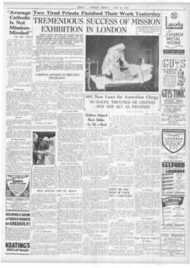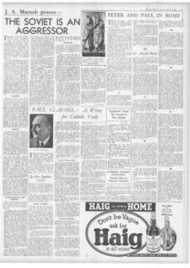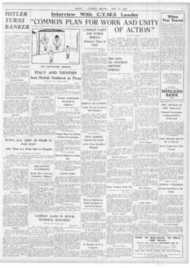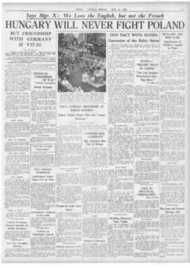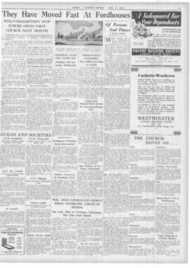Page 11, 30th June 1939
Page 11

Report an error
Noticed an error on this page?If you've noticed an error in this article please click here to report it.
Tags
Share
Related articles
Scotland On The March Again But Certain Industries Are...
Industrial Scotland Is 100 Years Out-of-date
" Dear Old Scotland"
Five-yeah Plan For Scotland?
Less Work, More Sickness Than In England
Depressing Story About Scotland
From Our Scottish Correspondent How many Scotsmen, one wonders, realise that infant mortality in Scotland is about 40 per cent. higher than in England, and about drathle what it is in some European countries. At the beginning of the present century it was the other way round.
As Si" John Orr, Director of the Rowett Research Institute, Aberdeen, points out in the foreword " The first essential .is food . . . but instead of producing more, land is going out of cultivation and our countrymen, the most virile fart of our population, are drifting to the towns to swell the ranks of the unemployed who are deteriorating in the slums of our cities. Every family on the land is an asset to our country ; every unemployed family is a liability. The improvement of national health and the development of agrieulture go hand in hand. A prosperous countryside and a healthy people are the only true foundations of national greatness."
Policy For Farmers
Dr. Fraser tries to show what could be done to initiate an agricultural policy suitable to the needs of Scotland.
He makes it perfectly clear that for the past seven years or more Scottish farming has been treated by those in authority as if it were
just the same as English. He reminds us that whereas there has been a subsidy on wheat and sugar beet. nothing has been done to encourage the growth of oats, which at one time was, and still might be, the staple food of Scotsmen. He informs us that Scotland is going out of cultivation at the alarming rate of 1,000 acres a year.
Farms or crofts are fewer by 100 a year. Workers are leaving the land at the rate of 1,000 a year. Even If the land does revert to grass it no longer pays to breed stock in view of foreign importation of beef and mutton. At ihe present time only one quarter of Scotland is in any way cultivated. About 48.5 per cent. of the total 19 million acres of land consist of rough grazing.
160 Thousand Only Are Farmers
It gives one rather a shock to learn that there are only 160,000 men and women on the land as compared with the 1.340.310 persons who are insured against. unemployment. What is taking piece is the arable lands in the Lowlands being given over In sheep and cattle, while the hills are being abandoned for stock raising.
It was a long and unbroken era of world peace which ruined Scottish farming, for in times of peace the ports of Britain are open to the world's supplies of food.
" Scotland's corn went down before the abundant grain of the New World. Scotland's hoof followed corn when re.frigeration brought the cheaply produced meat of the Southern hemisphere to the community's door in the Old World. First grain, then wheat. It is only a question of time before milk, vegetables and fruit follow meat and grain. Progress in food preservation is more rapid, more effective, than improvements in food production."
The result of all this can be seen from the statistics of agricultural decay, even more so in the statistics of the bankruptcy courts.
Questions of Food in War To quote Dr. Fraser once more: " The Great War demonstrated that while the heart of our island people is in the right place, its stomach may be in a most awkward situation—separated by the waves it rules from a sunk cargo of imported food."
He goes on to explain that " either the British State must control foreign and imperial competition by regulation of quantity by quota, and of price by import duty, or the State must grant subsidy," And he urges the vital importance of granting a subsidy for oats, wheat and sugar beet being of relative unimportance in Scottish farming. He answers the objections which may he raised that it is hardly worth while attempting to save the mere 9 per cent. of Scotland's population now engaged in agriculture, merely by proving conclusively how unsafe are our foreign fond supplies, and he advocates the policy formulated and expounded by Sir John Orr, that the sole reason for growing food at all is that people should eat it.
" The question of the degree of profit made by growing it, although the primary consideration of the farmer, is of secondary interest to the State." It is the businesss of the State to encourage the production of such articles of food as are essential to the health of the people. " Under this policy agriculture is subsidised on this sole ground, that it ministers to the health and happiness of the community as a whole."
Dr. Fraser concludes his booklet by proposing the following remedies:
(a) An effective subsidy on the growing of oats.
(h) The establishment under National Trust of a comprehensive small-holding (c) The establishment of holiday camps throughout the Highlands under National Trust, where homegrown foods would be consumed on the spot.
(d) A chain of experimental farms throughout Scotland.
blog comments powered by Disqus




